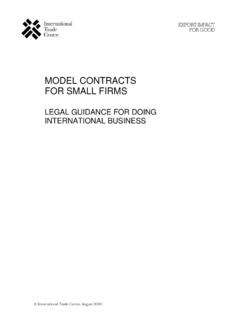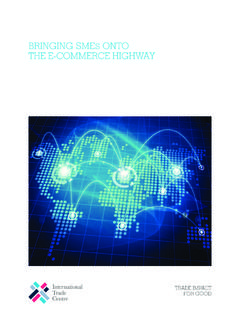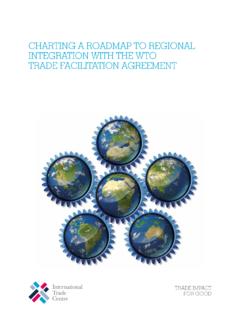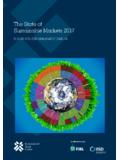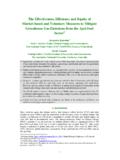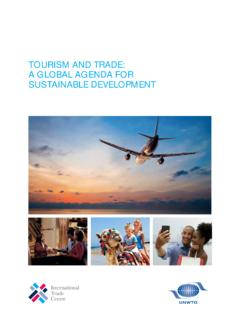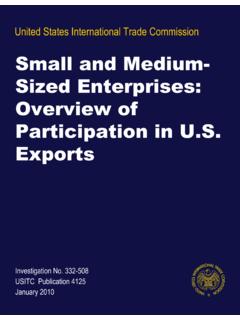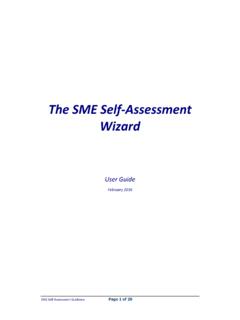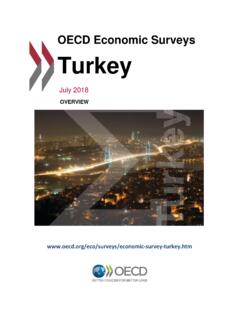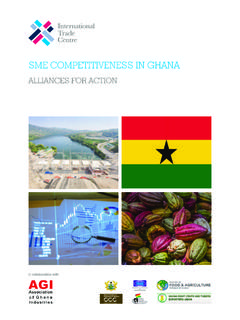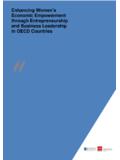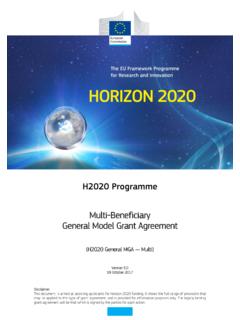Transcription of Managing Quality in Egypt
1 Managing Quality in Egypt A directory of services for SMEs ENGINEERINGEXPORT COUNCIL OF EGYPTIn collaboration with:The International Trade Centre (ITC) is the joint agency of the World Trade Organization and the United : 16, Tadrib El Motadaribeen St. EL AMIREYA El-Zaytoun, Cairo Governorate, EgyptTelephone: +20 2 22845503E-mail: Website: Organization for Standardization & Quality (EOS)Address: Bundesallee 100 38116 Braunschweig, Germany Telephone: +49 531 592-82 20 Fax: +49 531 592-82 25E-mail: Bundesanstalt (PTB) International Trade Centre 2017In partnership with:Address: 26A, Sherif Street, El Emobilia Building 7th Floor, Downtown, Cairo 11511, EgyptTelephone: +20 2 2395 5756E-mail: Website: Export Council of Egypt (EEC-EG) Managing Quality IN Egypt A DIRECTORY OF SERVICES FOR SMES Geneva, Switzerland/Cairo, Egypt , 2017 Managing Quality IN Egypt ii Abstract for trade information services ID= 43212 2017 C-13 818 MAN International Trade Centre (ITC), Physikalisch-Technische Bundesanstalt (PTB), Egyptian Organization for Standardization and Quality (EOS), Engineering Export Council of Egypt (EEC-EG).
2 Managing Quality in Egypt : A directory of services for SMEs Geneva/Cairo: ITC/PTB, 2017. xii, 96 pages Doc. No. Companion guide and supplement to the publication, Export Quality Management: A guide for small and medium-sized enterprises, country adaptation for the Egypt . This publication provides an overview of the country s national Quality infrastructure that includes food safety and animal and plant health; it also provides contacts of Quality -related service providers in Egypt . Descriptors: Egypt , Quality Control, Quality Management, Standards, Conformity Assessment, Exports, Inspection, Testing and Analysis Services, Certification, Metrology, Accreditation, SPS, TBT, Directories, SMEs, Services. English, Arabic (separate editions) ITC, Palais des Nations, 1211 Geneva 10, Switzerland ( ) The designations employed and the presentation of material in this publication do not imply the expression of any opinion whatsoever on the part of the International Trade Centre and Physikalisch-Technische Bundesanstalt (PTB) concerning the legal status of any country, territory, city or area or of its authorities, or concerning the delimitation of its frontiers or boundaries.
3 Mention of firms, products and product brands does not imply the endorsement of ITC and PTB. Developed by Dr. Ahmed Sultan, Quality Director, National Organization for Military Production in cooperation with ITC and PTB. Cover design and illustration: International Trade Centre, Kristina Golubic International Trade Centre All rights reserved. No part of this publication may be reproduced, stored in a retrieval system or transmitted in any form or by any means, electronic, electrostatic, magnetic tape, mechanical, photocopying or otherwise, without prior permission in writing from the International Trade Centre. Managing Quality IN Egypt iii Foreword by EOS This book is prepared to describe briefly the pillars of the national Quality infrastructure in Egypt , and the services of the entities and institutions. A technical Quality infrastructure is a combination of initiatives, institutions, organizations, activities and competent persons.
4 It includes a national Quality policy and institutions to implement it, a regulatory framework, Quality service providers, enterprises, customers, and consumers (including citizens as consumers of government services). Setting up a Quality infrastructure system is one of the most positive and practical steps that a developing nation can take on the path forward to developing a thriving economy as a basis for prosperity, health and well-being. A Quality infrastructure is a system contributing to governmental policy objectives in areas including industrial development, trade competitiveness in global markets, efficient use of natural and human resources, food safety, health, environment and climate change. It offers a complete package addressing the needs of the nation s citizens, of customers and consumers, and of enterprises and other organizations that offer them products and services.
5 The Quality infrastructure system covers essential aspects such as policy, institutions, service providers, and the value-adding use of international standards and conformity assessment procedures, along with accreditation to ensure competence of conformity assessment bodies. The national Quality infrastructure is the institutional framework that establishes and implements the practice of standardization, including conformity assessment services, metrology, accreditation and market surveillance. We would like to present this book in collaboration with the International Trade Centre, the Physikalisch-Technische Bundesanstalt, the Egyptian Organization for Standardization and Quality , and the Engineering Export Council of Egypt to be a guiding hand for exporters and importers to enhance trade exchange. Ashraf Ismail Mohamed Afifi Chairman Egyptian Organization for Standardization and Quality Managing Quality IN Egypt iv Foreword by EEC-EG Quality and standards play an important role nowadays not only for export purposes but also for strengthening our national industry in the context of global trade to enjoy fair trade practices based on harmonized technical regulations for market requirements and applying technical regulations.
6 Quality infrastructure is an important pillar to ensure competiveness for Egyptian products and facilitate their free movement between countries. Egyptian exports are influenced greatly by all national organizations responsible for ensuring the Quality and safety of products; in addition to fulfilling the required specifications in order to export. Accreditation has a positive effect on promoting national exports and on facilitating cross-border trade. Exporting products to international markets requires conformity of products to the requirements of technical regulations and standards of the importing countries. Setting up a powerful national Quality infrastructure is one of the most positive and challenging steps that a developing nation can take on the path forward to establish a thriving economy as a basis for prosperity, health and well-being. In this context, the Engineering Export Council of Egypt (EEC-EG) works closely with several organizations to support and enhance the competitiveness of the Egyptian products to enable them to compete in the international markets.
7 This book is a result of the collaboration between the International Trade Centre, the Physikalisch-Technische Bundesanstalt, the Egyptian Organization for Standardization and Quality , and EEC-EG to create a clear guide for exporters and importers to pave their way for a better understanding of Quality and standards in international trade. We hope this guide will be a useful resource for Egyptian enterprises to effectively compete in the global market. Eng. Amr Abou Freikha Maha Saleh Chairman Executive Director Engineering Export Council of Egypt Engineering Export Council of Egypt Managing Quality IN Egypt v Foreword by ITC and PTB Today s competitive global trade environment demands that small and medium-sized enterprises (SMEs) invest in productivity and Quality . Having goods and services that can compete in international markets requires attention to standards and meeting the technical requirements behind these standards.
8 For many SMEs, however, this can be a challenge especially in view of the growing number of these standards, both public and private. Governments impose a range of legitimate technical requirements to protect the health and safety of their citizens as well as to safeguard plant and animal life and the environment. Industry associations, multinationals and retailers also develop a range of voluntary private standards to meet the increasingly discerning demands of consumers. ITC research has shown that exporters and importers face many challenges related to non-tariff measures. Among the most significant are Quality -related technical regulations, conformity assessment procedures, and sanitary and phytosanitary (SPS) measures. To ensure that enterprises can remain competitive and participate in value chains, they need up-to-date information about the applicable technical requirements in their target markets.
9 These SMEs must adapt their products and processes to satisfy market requirements and demonstrate compliance with these regulations. They must check whether recognized conformity assessment services are available in their country, or whether they must turn to recognized but more costly foreign certification bodies. Gathering such information is costly and burdensome for small businesses, but necessary if they are to internationalize into regional and global markets. Given this context, the International Trade Centre (ITC) and Physikalisch-Technische Bundesanstalt (PTB the National Metrology Institute of Germany) are joining forces with partners in developing countries to help SMEs gain wider access to relevant Quality management information. ITC and PTB are working with national partners to develop a series of customized national versions to accompany the ITC/PTB guide, Export Quality Management: A Guide for Small and Medium-sized Exporters.
10 National versions are tailored to the needs of each economy. They explain the Quality infrastructure and the economy s SPS system, outline local services related to standards, metrology, accreditation and conformity assessment; and point to further information sources on standards, technical regulations and SPS measures in target markets. The national publications also serve as directories, with contacts for Quality -related institutions. These targeted documents are published in English and, wherever possible, in the economy s national language. They are accompanied by a series of training programmes for SMEs to raise awareness and knowledge of how to improve market access through compliance with standards, technical regulations and SPS measures. Managing Quality IN Egypt vi We are confident that this guide will be a useful resource and practical tool for SMEs in Egypt in their efforts to improve competitiveness and increase their participation in international trade.
